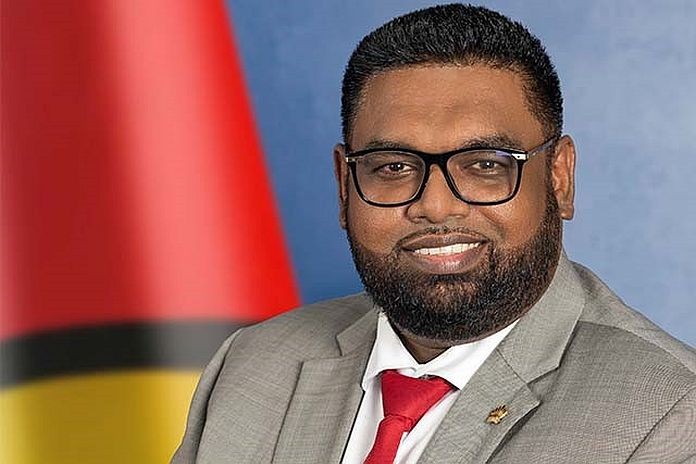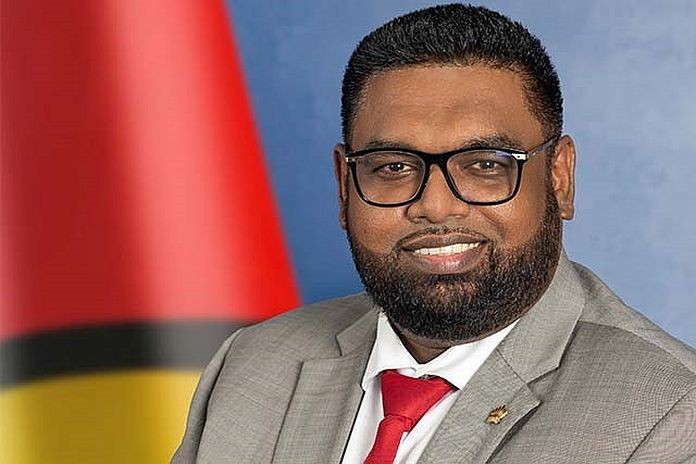Guyana to dismantle barriers to intra-regional agricultural trade, says president Ali

GEORGETOWN, Guyana (DPI) – His Excellency Dr Irfaan Ali announced that Guyana will push aggressively for the dismantling of barriers that restrict intra-regional agricultural trade in a bid for the country, and by extension, the Caribbean, to not only attain food security but to also export food.
The Guyanese president, who is the lead head of government with responsibility for agriculture in the CARICOM Quasi Cabinet, delivered the keynote address virtually at the 16th Caribbean Week of Agriculture (CWA) 2021.
“We cannot seriously speak of significantly denting the enormous and unsustainable regional food import bill yet, unwittingly or otherwise erect, and keep in place non-tariff barriers (NTBs), which impede regional trade in agriculture produce and products.”
The president stated that his government would be “bullish” in pressing to dismantle the barriers. “I know that there are vested interests who wish to retain these barriers, but the choice facing us is clear,” he said.
In his pre-recorded address, president Ali pointed out that the promotion of regional initiatives aimed at eliminating non-tariff barriers to trade is among the critical areas being addressed by the Special Ministerial Taskforce.
He also said that CWA2021 should address two fundamental questions why the transformation of regional food systems is necessary and how best the Caribbean can pursue the transformation process.
“The Caribbean has the resources to ensure greater regional food security. It remains a travesty that our region, blessed with arable lands, abundant freshwater supplies and skilled agricultural workers, imports more than US$5 billion annually in food. We have the means to slash our regional food import bill, produce more of the food we consume and, in the process, generate sustainable livelihoods through agriculture.”
The president said that Guyana, being resource-rich inland and freshwater, is desirous of leading the charge by making available appropriate lands as part of the process of promoting cross-border investments in agriculture.
“Guyana is currently embarking on a process of consolidating unused and underutilised lands with the aim of making suitable lands more readily available for supporting large-scale agriculture investments.”
The president noted that the Caribbean must also become more food secure since climate change can imperil global food supply, subjecting the region to external-induced shocks.
Economic opportunity
In addition to ensuring that the region is food secure, the head of state also believes that transforming the sector can open economic opportunities, including food exportation.
“By 2040, it is estimated that there will be an additional 1.4 billion mouths to feed. Food will be in high demand. This represents both a challenge for us to feed ourselves and also an economic opportunity to help feed the world. We must reform our food systems in order to respond to these challenges and seize the opportunities that will arise from the demand for more food.”
The president also underscored that the transformation of regional food systems must involve the regional private sector. To this end, he added, the Special Ministerial Taskforce on Food Production and Food Security, headed by Guyana’s minister of agriculture, Zulfikar Mustapha, and the CARICOM Private Sector Organisation (CPSO) has been actively working together.
He said that the groups have since contributed significantly to identifying specific areas for regional policy support in targeting investments and intra-regional trade, particularly in poultry, niche vegetables and commodities such as corn, soy, rice, coconut, beef and meat of ruminants.
The Special Ministerial Taskforce has also initiated dialogue with regional and strategic entities regarding the de-risking of the regional agricultural sector. It has also identified an innovative Agricultural Insurance Product that is being pioneered by a regional company, among other related initiatives.
“I have been advised that a sub-committee is currently being established specifically to address the possibilities for establishing similar agricultural insurance on a regional scale. We are moving forward with the agenda to transform regional food systems.”
The president further explained that given agriculture’s extreme reliance on favourable climatic conditions, there is now an even stronger need for appropriately tailored and accessible risk transfer financial services. In this regard, the absence of adequate insurance has severely constrained investment in the sector.
“A central focus of reforming Caribbean food systems should entail the rapid dismantling of barriers, which inhibit intra-regional trade in agricultural produce and products, increasing food production, increasing investments, promoting climate-resilient agriculture and de-risking the sector.”
SDGs and Climate resilience
President Ali also noted that food security is central to attaining many of the Sustainable Development Goals (SDGs). He said that if the region is to attain the SDG’s, then it must transform its food systems to ensure greater food security.
The president added that this transformation must also result in more climate-resilient agriculture since the region is particularly vulnerable to the adverse effects of climate change and natural hazards. These include overtopping sea and river defences, salt-water intrusion into agricultural lands, flooding, drought and the threats posed by hurricanes and other natural disasters.
“It is therefore imperative that attention is given to building climate resilience in order to transform the region’s agri-food system.”
Guyana’s replicable transformation model
The head of state emphasised that Guyana, as lead on agriculture, agricultural diversification and food security in the Caribbean, does not take its responsibility lightly and has demonstrated its willingness and commitment to lead from the front.
The president stressed that Guyana is committed to the sustainable and equitable transformation of its food systems at a national level. The country’s efforts to do so are rooted in the commitment to the ‘2030 Agenda’ and the obligation to “leave no one behind”.
“We are dedicated to ensuring that there is access to safe and nutritious food for everyone, the reduction of on-farm and post-harvest waste and loss and the implementation of a circular food economy. As part of this commitment to providing safe and nutritious food for all, Guyana is taking steps to consolidate its National School Feeding Programme by strengthening connections between consumers and food producers, by fostering more robust food value chains and creating solid alliances between farmers and the wider society, to deliver safe, healthy and nutritious school meals.”
The head of state pointed out that Guyana is also expanding agricultural production and productivity, including through increased investments in large-scale agricultural production and the provision of incentives to boost investment in the sector:
- Strengthening its agricultural institutions to provide greater support to the sector;
- Improving the country’s agricultural-support infrastructure;
- Including drainage and irrigation and farm-to-market roads;
- De-risking the agricultural sector;
- Diversifying and modernising local agriculture to create a more resilient sector;
- Promoting an increase in research and development and innovation in agriculture to pursue climate-smart agriculture;
- Intensifying increased value-added through agro-processing,
- Adopting an inclusive approach to the management of its agricultural sector and by regular consultation with stakeholders.
CWA2021 was planned in collaboration with the Inter-American Institute for Cooperation on Agriculture (IICA), the Food and Agricultural Organization of the United Nations (FAO) and the Caribbean Research and Development Institute (CARDI).
Source: caribbeannewsglobal.com



